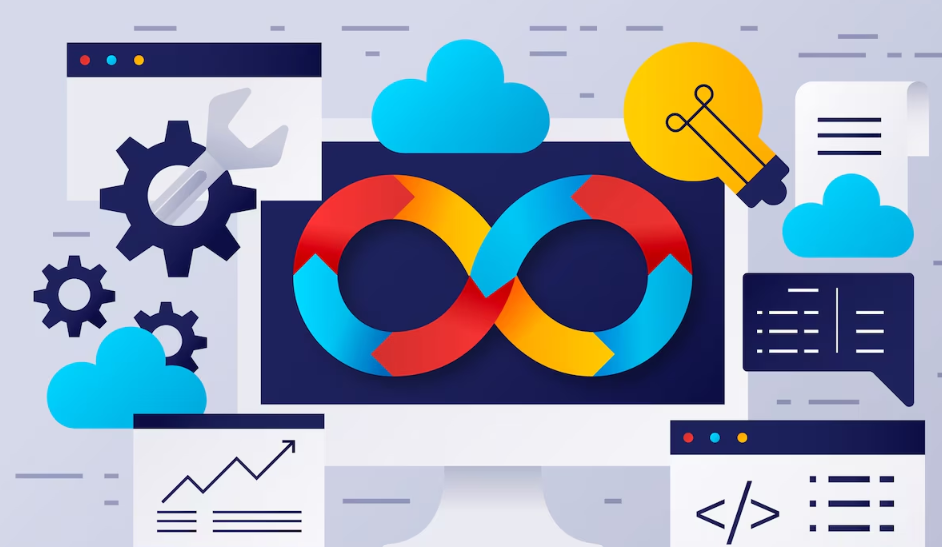Cloud-powered tech landscape, there’s one word that keeps popping up in every engineering conversation: DevOps. What started as a cultural shift has now become a foundational element of modern software development.
But what exactly makes DevOps so important in the software industry—especially now, when cloud computing dominates the way we build, deploy, and scale applications?
Let’s break it down in plain terms, explore its real-world value, and see why companies that embrace DevOps are winning big.
What is DevOps, Really?
Let’s cut through the jargon: DevOps is the practice of unifying software development (Dev) and IT operations (Ops) to shorten the development lifecycle, improve code quality, and deliver features more reliably.
It’s not just about tools. It’s a mindset. A culture. A way of building and releasing software that breaks down silos between teams and replaces bottlenecks with automation, communication, and continuous feedback.
In short: DevOps helps you ship better software, faster—and that’s never been more critical than in the cloud
How the Cloud Changed Everything
Before the cloud, deploying software often meant waiting on physical servers, long lead times, and painful manual setups. That world is gone.
Today, services like AWS, Azure, and Google Cloud offer near-instant provisioning, global scalability, and advanced monitoring—but only if you have the processes to take advantage of them. That’s where DevOps comes in.
The cloud made infrastructure programmable. DevOps makes that power usable.
DevOps + Cloud = Speed at Scale
In a world where customers expect updates weekly (or daily), speed is everything. DevOps enables rapid, reliable delivery through:
-
Continuous Integration (CI) – merging code regularly and testing it automatically
-
Continuous Deployment (CD) – pushing tested code to production without delays
-
Infrastructure as Code (IaC) – provisioning servers and services via code, not manual clicks
Together with the cloud, this creates a system where developers can ship code to production in minutes, not days or weeks.
Teams that master this have a massive edge. They’re agile, responsive, and can release features—or fix bugs—faster than their competitors.
It Cuts Costs While Boosting Reliability
One of the most underrated benefits of DevOps in the cloud is cost control. By automating infrastructure, scaling based on usage, and catching bugs early through testing, companies avoid the massive expenses of outages, rollbacks, or over-provisioned servers.
Cloud-native DevOps also encourages:
-
Auto-scaling: Your app scales up when traffic spikes and down when it doesn’t, saving you money.
-
Failover & recovery: Built-in redundancy means less downtime and fewer late-night emergency calls.
-
Resource monitoring: Know exactly what’s being used, when, and why.
This level of insight and automation makes your systems leaner, more efficient, and more resilient.
It Makes Teams Happier and More Productive
Here’s a truth every engineering manager knows: happy devs write better code.
DevOps reduces the pain points that frustrate software teams—manual deployments, “it works on my machine” issues, unclear handoffs, and surprise production bugs. Instead, it fosters:
-
Clear ownership and communication
-
Faster feedback loops
-
Cleaner pipelines from dev to prod
With DevOps best practices, developers focus on building features, not babysitting environments. Operations teams stop firefighting and start optimizing systems. Everyone wins.
And let’s be honest: in an industry dealing with burnout, improving workflows and reducing stress matters—a lot.
DevOps Fuels Innovation and Experimentation
Innovation requires freedom to test new ideas quickly, without fear of breaking things.
With automated testing, isolated environments, and rollback mechanisms, DevOps gives teams the confidence to experiment.
Want to A/B test a new feature? Ship it to a small subset of users. Found a bug? Roll it back instantly. Need a sandbox to test an API change? Spin one up in minutes.
This level of agility is only possible when DevOps and the cloud work hand-in-hand.
Security is Built Into the Pipeline
In the past, security checks came last—after code was written, tested, and sometimes already live. DevOps changes that by shifting security left in the development cycle.
With DevSecOps, teams integrate security tools into every phase:
-
Static code analysis during development
-
Dependency scanning during CI
-
Cloud configuration validation before deployment
-
Real-time alerts in production
This proactive approach catches vulnerabilities early, keeps data safe, and meets compliance requirements without slowing down the dev cycle.
Why DevOps Is No Longer Optional
The software industry is evolving—fast. Customer expectations are higher. Competition is global. Systems are more complex, and teams are often distributed.
In this environment, DevOps isn’t just nice to have—it’s essential.
Companies that adopt DevOps:
-
Deliver faster
-
Fail less often
-
Recover quicker
-
Attract better talent
-
Adapt to market changes with ease

